- Home
- E. E. Knight
Choice of the Cat
Choice of the Cat Read online
Choice Of The Cat
The Vampire Earth
Book II
E.E. Knight
CONTENT
Chapter One
Chapter Two
Chapter Three
Chapter Four
Chapter Five
Chapter Six
Chapter Seven
Chapter Eight
Chapter Nine
Chapter Ten
Chapter One
The Great Plains Gulag, March of the forty-fifth year of the Kurian Order: Only the bones of a civilization remain, monuments to mankind's apogee. Nature and time gnaw away the rest. Derricks still stand in this corner of oil country, giant iron insects surveying the countryside. Beneath them, the pumps rust, scattered in the long yellowish grass like metal herbivores, snouts thrust into the earth. The former wheat fields, fallow for generations and returned to native forest or prairie, feed longhorns, deer, and canny wild pigs. It is a land of receding horizons, a stopped watch, timeless.
The soil under cultivation bears the turned over, trampled look of spring plowing. The tools and methods used on the stretches of farmland would make a twentieth-century resident either stare in wonder or spit in disgust. Horse-drawn plows, some with just a single blade, sit at the edges of the fields, where they were abandoned at quitting time, plots fertilized only by what comes out of the back end of an animal.
The agricultural settlements at the center of the remaining fields, always near a road or rail line, look more like chain-gang camps than family farms. Surrounded by barbed wire and watchtowers, the clapboard barracks that house the workers and their families cry out for a coat of paint and a new roof to replace the flapping plastic tarps covering assorted holes. Trash heaps and pit toilets decorate the compounds among pitiful vegetable gardens. The children playing amid the tight-packed buildings flirt with nudity, so worn away are their clothes.
Near the gate of these camps a more substantial building usually stands at a respectful distance from the barracks, avoiding contact like a visitor to a leper colony. Often a sturdy pre-22 brick construct; the windows hold glass behind bars or shutters, and curtains behind the glass.
A few miles north of Oologah Lake along old State Route 60, one of these collective farms, known to its residents as the Rigyard, is nestled between gently rolling hills. Two rows of tall wire fencing encircle the camp. Barracks laid out foursquare sit in the shadow of two watchtowers, dwarfed in turn by two cavernous garages like enormous Quonset huts. The garages are patchworks of earthen wall, structural iron, and corrugated aluminum. On the other side of them, in a commanding position near the gate, an L-shaped cinder-block building dating to the 1950s folds itself protectively around a set of gasoline pumps. A water tower—a recent addition, judging from the new shine to the steel—leans slightly askew above, adding a jaunty top hat to the guardhouse. Behind the cinder-block building, a fine two-story house stands in splendid isolation at the farthest point upwind from the barracks, circled first by a porch and then a set of razor-wire fencing with padlocked gate.
Each watchtower contains a single sentinel dressed in green-brown-mottle camouflage fatigues and black leather hunting cap. The sentry to the south is the more alert; he occasionally crosses his little crow's nest to glance up and down the highway bordering the camp's southern fence. The one to the north chews a series of toothpicks in appropriately beaverish front teeth. He watches a trio of smock-clad women wash clothing in the community sink set between the barracks.
Were the other guard equipped with an excellent pair of binoculars (unlikely, but possible), perfect eyesight (still less likely, as guarding farmers and mechanics is reserved for older members of the Territorials), and intelligent initiative in carrying out his duty (the phrase "cold day in hell" springs to mind) he would have paid attention to the gully winding up the hill that shelters the Rigyard from the prevailing winds. The wooded cut in the hill offers ample concealment and a commanding view, whether for simple observation or an organized attack.
A figure possessing all those qualities lies on that hill, surrounded by the white and yellow and red wildflowers of an Oklahoma spring. He is a muscular, long-limbed young man with coppery skin and wary brown eyes. Dressed not so differently from his ancestors on the Sioux side of his family, he wears a uniform of buckskin, save for a thicker cowhide equipment belt and boots. Lustrous black hair is drawn back from his face into a pony tail, giving him the illusion of closely cropped hair from every direction but behind, where it dangles to his shoulders. He wears an intent expression as he examines the camp. A young cheetah watching a watering hole might exhibit such wariness, unsure whether the vegetation contains game or a lion ready to pounce. His eyes wander from point to point in the camp with the aid of a pair of black binoculars, lingering here and there while his forearm acts as a monopod. Like the bucktoothed guard in the southern tower, his mouth is also working, thoughtfully nibbling on the tender end of a blade of seed-topped grass.
His gaze returns to the wire-enclosed yard of the two-story house. In the grassy back lawn of the house, two T-shaped metal posts face each other, missing the clothesline that once joined them. Instead of wash drying in the afternoon sun, three men and a woman are painfully attached to the improvised gibbet. Their wrists are clasped behind them and tied to the metal crossbeam above, tight enough to dislocate a shoulder if they slump in their bonds.
He knows that death awaits the four—not from pained exhaustion or exposure—but from something quicker, more horrible, and as sure as the setting sun.
* * *
The senior lieutenant of Foxtrot Company set down his binoculars and focused his eyes a few feet in front of him on a flowering coral bean, its delicate red spindles inclining toward the sun. The diversion failed; though they were a good kilometer away, he could still see me agonized figures in me yard. His shoulders throbbed with sympathetic pain.
After four years' service to the Cause, his sensitivity to suffering had grown more acute, rather than less.
Lt. David Valentine looked back down into the gully. His platoon, numbering thirty-five in all, rested with backs up against leafing trees, using their packs to keep their backsides off the rain-soaked earth. They had covered a lot of ground since skirting the northern edge of Lake Oologah that morning, moving at a steady, mile-eating run. Rifles rested ready in their laps. They wore leather uniforms frilled in variegated styles to taste. Some still wore their winter beards, and no two hats matched. The only accoutrement his three squads shared were their short, broad-bladed machetes, known as parangs—though some wore them on their belts, some across their chests, and some sheathed them in their moccasin-leather puttees.
They didn't look like mixture of legend and alien science, part of a elite caste known as the Hunters.
Valentine signaled with two fingers to the men waiting in the gully, and Sergeant Stafford climbed up the wash to join him in the damp bracken. His platoon sergeant, known as Gator off-duty because of his leathery skin and wide, toothy grin, worked slowly to Valentine's overlook. Wordlessly, the lieutenant passed Stafford his binoculars. Stafford examined the compound as Valentine chewed another inch off the grass stalk clamped in his teeth.
"Looks like that last sprint was for nothing," Valentine said. "The tractor trailer pulled in here. We wouldn't have intercepted anyway—this must be a pretty good stretch of road."
"How do you figure that, sir?" Stafford said, searching the compound in vain for any sign of the tanker truck they'd spotted crawling through the rain that morning. The platoon dashed cross-country in order to ambush the tempting target. Thanks to the state of the roads in this part of the Kurian Zone, the rig couldn't move much faster than the Wolves could run.
"Look at the ruts by t
he gate, turning off the road. They've got to have been made by an eighteen-wheeler," Valentine said.
"Could have been from yesterday—even the day before, Lieutenant."
Valentine raised an eyebrow. "No puddles. Rain would have filled in something that deep. Those were made since the shower ended—what?—a half hour ago?"
"Err... okay, yeah ... so the truck's in one of those big garages getting worked on. We get in touch with the captain, the rest of the company is here in a day or two, and we burn the compound. I figure fifteen or twenty guarding this place at most. Ten's more likely."
"I'd like nothing better, Staff. Time's a problem, though."
"Val, I know food's short, but what else is new? There's enough game and forage in these woods—"
"Sorry, Gator," Valentine said, taking the binoculars back. "I misspoke. I should have said time's running short for them."
Stafford's eyebrows arched in surprise. "What, mose four tied up down there? Okay, it's ugly, but since when have we gotten dead over the punishments handed out by these little Territorial commandants?"
"I don't think it's just punishment," Valentine said, his eyes now on the two-story house.
"Hell, sir, you know these collaborator creeps. . . . They'll flog a woman for not getting the skid marks out of their skivvies. These four probably were last out of the barracks for roll call or something. God knows."
Valentine waited for a moment, wondering whether to give voice to a feeling. "I think they're breakfast. There's a Reaper in that house, maybe more than one."
Sgt. Tom Stafford blanched. "H-how d-do you figure that, sir?"
Valentine read the sergeant's fear with a species of relief. He wanted a subordinate in mortal fear of the Reapers. Any man who did not tremble at the thought of facing a couple of Hoods was either a fool or inexperienced, and there were far too many inexperienced Wolves in Foxtrot Company. Whemer or not the whole lot, officers included, were fools was a question Valentine sometimes debated with himself on long winter nights.
"Look at the first story of the house, Sergeant," Valentine said, passing the binoculars back. "It's a nice day. Someone is letting in the spring air. But that second story now ... shuttered. I think I even see a blanket stuffed in between the slats. And that little stovepipe coming out of the wall— that's got to be for a bedroom, not the kitchen. See the vapor? Someone has a fire going."
"Dark and warm. Hoods like it like that," Stafford agreed.
"My guess is that after the sun's down, the visitor will rise and go about its business. It won't feed till almost morning. It wouldn't risk taking them before it could sleep safe again—you know how dopey they get after feeding."
"Okay, sir, then that's the time to hit'em. Tomorrow morning." Stafford couldn't keep the excitement out of his voice. "Maybe the captain could even get here by then. That refinery he's scouting can't be more than thirty miles away. They feed, dawn comes, and they button up in that house. We burn them out, even if it rains again, and have enough guns to knock'em down, and keep'em down till we can get in with the blades."
"That would be my plan exactly, Sergeant," Valentine agreed. "Except for one thing."
"What, you think that house won't burn if it rains again? Those phosphorous candles, I've seen them burn through tin, sir. They'll get the job done."
"You missed my point, Staff," he said, spitting out the thoroughly chewed blade of grass. "I'm not going to let the Hoods get their tongues into those poor bastards."
Valentine knew the word incredulous was probably not in his platoon sergeant's vocabulary, but Stafford's expression neatly illustrated the meaning of the word. "Errr... sir, I feel for them, too, but hell, it's too much of a risk."
"Having thirty Wolves within a mile of the Reapers is a risk, too. Even if we all concentrate on lowering lifesign, they still might pick up on us. Then we'd be faced with Reapers coming at us in the dark."
Stafford's left eye gave a twitch. The Reapers hunted not by sight or scent, but by sensing an energy created by living beings. Energy the Reapers' Masters desired.
"The sun isn't waiting," Valentine continued. "We're going to hit them now, while most of the guards are off in the fields. Keep an eye on things from up here—whistle if anything happens."
The lieutenant returned to his platoon, scooting backwards on his belly until he reached the cut in the hillside. He gathered his three squads around him.
"Heads up, Second Platoon. The captain detached us with orders to raise a little hell if we get the chance, and we just got it. There's a pretty big civvie compound on the other side of this hill. Looks like farmworkers and maybe some mechanics—there's a couple of big garages behind the wire. Two guard towers with a man in each. I figure most of the able-bodied are out in the fields to the north, and the garrison is keeping an eye on them. Chances are, there are only a few left in the compound, counting the two in the towers. Looks like there could be Hoods in there, too."
Valentine gave them a moment to digest this. Newer Wolves composed the majority of Foxtrot Company, rebuilt after being bled white in action east of Hazlett, Missouri, in the summer of '65. Each of his three squads had only one or two reliable veterans; most of the experienced men were with the captain or leading smaller patrols on this scouting foray into the Gulag lands north of Tulsa. While all had gone through the arduous training of Southern Command, the gulf between training and experience had been crossed by only a handful of his men. But the newbies were eager to prove themselves as true Wolves, and ail had reason to hate the Reapers and the Quislings assisting them.
Valentine's eyes searched the expectant eyes for a pair of almost cherubic young faces. "Jenkins and Oliver, take a map and head south. Sergeant Stafford will show you where the captain's headquarters is supposed to be. If he's not there, go back to summer camp south of the Pensacola Dam and report. If you do find him, tell him we're about to hit some Reapers. I expect the Territorials'll react, and there'll be columns from all over converging on this spot. Maybe he can bushwhack one. We're going to run east and wait at camp. Got it?"
Marion Oliver held up her hand. "Sir, can't we be in on the attack, then go find the captain?"
Valentine shook his head. "Oliver, I could sure use you, but just in case this goes to hell, the captain would want to know what we found, where we were when we found it, and what we were going to do about it.
"Now when it was raining earlier, I saw a few of you with those new rain ponchos you lifted outta that storehouse we broke into a couple days ago. I need to borrow three of them, and two volunteers...."
An hour later, Valentine walked down the empty road toward the camp, watching clouds build up again to the southwest. He hoped for more rain overnight. It would slow pursuit.
He wore a green rain slicker—an oily-smelling poncho borrowed from one of his men. Two of his best snap-shooters trailed just behind, brisk and bold in the open daylight, also wearing the rain gear stolen from the Quisling Territorials. Valentine had his sleeves tucked together to hide his hands—and what was in his hands.
As the trio approached the camp, the guard in the south tower near the road waved lazily and called something down to the cinder-block guardhouse below. Valentine smelled concentrated humanity ahead, along with the odors of gasoline and oil.
Like all Wolves, he possessed sharpened senses of hearing and smell and a mule's endurance, gifts from the Lifeweavers, humanity's allies in the battle against their fallen brothers from the planet Kur. Valentine made use of that hearing as he approached the camp, concentrating on the two guards walking up to the gate.
"Guy in front looks Injun, if you ask me," one uniformed figure commented to his associate. Valentine, still a hundred yards away, heard every word as if from ten feet. "Mebbe he's Osage or something."
"Didn't ask you, Gomez," the older of the two replied, scratching the stubble on his chin in thought. "Better go tell the looie, strangers comin' to the gate on foot."
"Franks is having a beer with that truc
k driver. They've been through six by now, prolly."
"You'd better tell him, or he'll have you stripped. He's jumpy what with the Visitors."
Valentine worked the safety on the pistol in his left hand. The gun in his right hand was a revolver; he covered the hammer with his thumb so it would not catch when he pulled it from the baggy coat sleeves. The seconds stretched as the Wolves approached the gate. The Territorial named Gomez returned with a tall thin man, who threw away a cigarette as he exited the gatehouse.
"Shit, four at the gate ...," Alpin, the young Wolf behind him muttered.
"Stick to the plan. I just want you two to get the guy in the tower," Valentine said, quickening his step. "Hi, there," he called. "I'm supposed to see a Lieutenant Franks. He's here, right? I got a message for him."
The bored guard at the southern tower leaned over to hear the exchange below, rifle held ready but pointed skyward. Valentine took a final glance around the compound. Back toward the barracks, a few women and children squatted on the steps or peered out of tiny windows at the visitors.
The tall lieutenant stepped forward and eyed Valentine through the wire, hand on his stiff canvas holster. "I don't know you, kid. Where's the message, and who sent you?"
"It's verbal, Lieutenant," Valentine answered. "Let me think.... It goes like this: You're a shit-eating, traitorous, murderous disgrace to the human race. That's about it."
The guards inside the gate froze.
"Uuh?" Franks grunted. Franks's hand seized his sidearm, the Velcro on the clasp making a tiny tearing sound, but Valentine had the two pistols out before the
Quisling's hand even got around the grip. Valentine squeezed off two shots from the automatic and one from the revolver into the lieutenant's chest, the officer's limbs jerking with the false nerve signals generated by the impacting bullets as he fell.
Behind him, the two Wolves raised their carbines. One had some trouble with his poncho, delaying him for a second, but Alpin put a bullet through the guard's chin while the sentry was still shouldering his rifle. The other Wolf got his gun clear in time to put another shot into the lurching figure even as the magazine-fed battle rifle fell out of the tower.

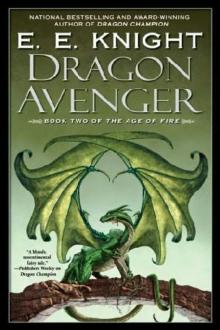 Dragon Avenger
Dragon Avenger Daughter of the Serpentine
Daughter of the Serpentine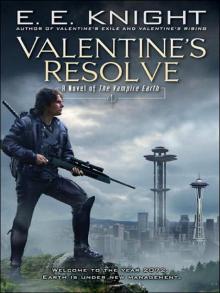 Valentine's Resolve
Valentine's Resolve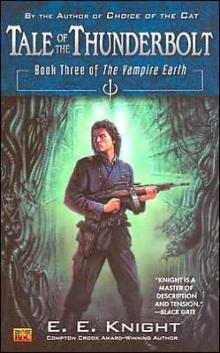 Tale of The Thunderbolt
Tale of The Thunderbolt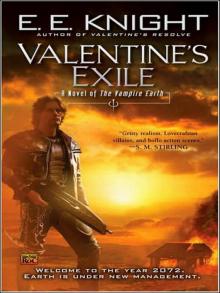 Valentine's Exile
Valentine's Exile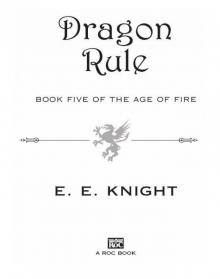 Dragon Rule
Dragon Rule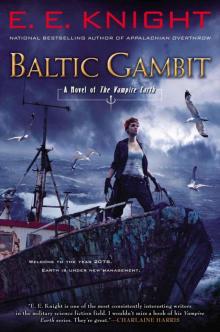 Baltic Gambit: A Novel of the Vampire Earth
Baltic Gambit: A Novel of the Vampire Earth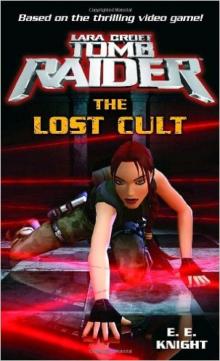 Lara Croft: Tomb Raider: The Lost Cult
Lara Croft: Tomb Raider: The Lost Cult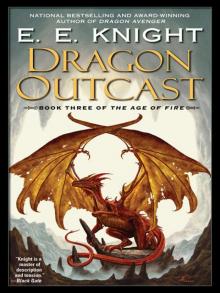 Dragon Outcast
Dragon Outcast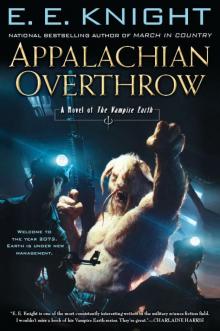 Appalachian Overthrow
Appalachian Overthrow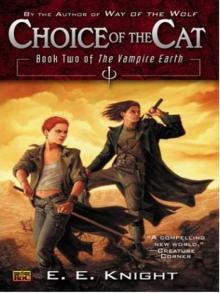 Choice of the Cat
Choice of the Cat Dragon Champion
Dragon Champion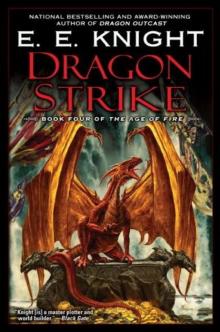 Dragon Strike
Dragon Strike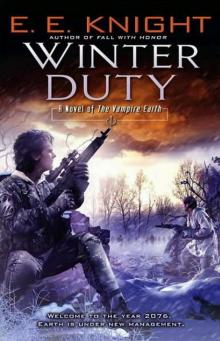 Winter Duty
Winter Duty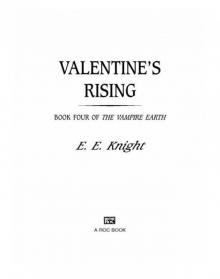 Valentine's Rising
Valentine's Rising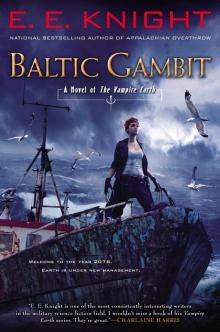 Baltic Gambit
Baltic Gambit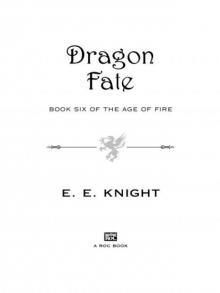 Dragon Fate: Book Six of The Age of Fire
Dragon Fate: Book Six of The Age of Fire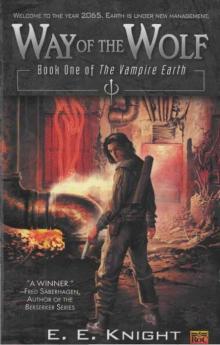 Way Of The Wolf
Way Of The Wolf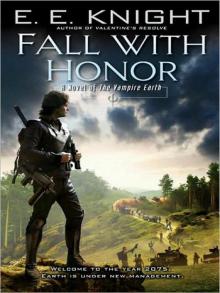 The Vampire Earth: Fall with Honor
The Vampire Earth: Fall with Honor